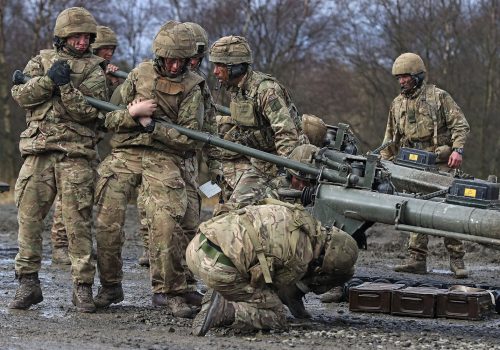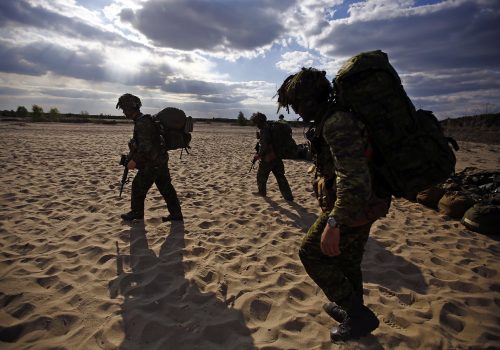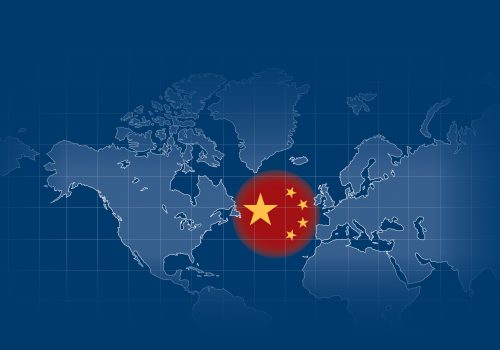Secretary General Stoltenberg explains why NATO is getting serious about cyber and China ‘is not an adversary’

Following criminal ransomware attacks on everything from US energy infrastructure to the global meat supply, NATO is increasingly making cyber defense central to its military coordination. “There’s actually an ongoing exercise now where cyber is part of the exercise,” NATO Secretary General Jens Stoltenberg said Monday at an Atlantic Council Front Page event. “So we are doing more and more together to help, to support, to increase awareness.”
In line with NATO’s policy that a cyberattack might be enough to trigger the Alliance’s Article 5 mutual-defense pact, Stoltenberg said a major attack would be considered just like any other military strike. “In a way it doesn’t matter whether it’s a kinetic attack or a cyberattack, we will assess as allies whether it meets the thresholds for triggering Article 5. It sends a message that we regard cyberattacks as seriously as any other attack.” A military response, Stoltenberg added, could come via cyber or “other means.”
Stoltenberg appeared at the Atlantic Council’s Washington headquarters ahead of next week’s NATO summit in Brussels and on a US trip that is also scheduled to include an Oval Office visit with US President Joe Biden.
During a question-and-answer session with Lara Seligman, Pentagon reporter for Politico, Stoltenberg delved into the array of challenges facing NATO—from Afghanistan to the Arctic. Here are a few of the key takeaways from the discussion.
Training Afghan troops post-withdrawal
- Stoltenberg said NATO will continue to fund Afghan security forces and is “looking into” how to train them even after all coalition forces withdraw from the country ahead of Biden’s September 11 deadline. Any training, he said, will take place in countries outside Afghanistan.
- NATO will keep a “civilian presence” in Afghanistan, Stoltenberg added, “helping [Afghans] with capacity-building and so on also at the ministerial level for the different security institutions.”
- Though Stoltenberg acknowledged it was a “difficult decision” to end the military mission in the country, he pointed out that “at some stage Afghans had to take responsibility for their own future, and that’s what they’re doing with continued support from NATO allies.”
Subscribe for events and publications on transatlantic security
Sign up for updates from the Atlantic Council’s Transatlantic Security Initiative, covering the debate on the greatest security challenges facing the North Atlantic Alliance and its key partners.
An uncertain climate
- Stoltenberg—who once served as United Nations special envoy for climate change—laid out a marker that “NATO should be the main platform for addressing the security consequences of climate change.”
- That means adapting military hardware and strategy to rising sea levels and a changing climate, but also exploring what climate change means for security threats, Stoltenberg explained.
- One of the biggest shifts with the changing climate is the opening of the Arctic. As Russia revives old Soviet military installations and China explores economic opportunities, “NATO is also increasing its focus and its presence in the Arctic,” Stoltenberg said. That presence includes everything from maritime patrols to submarines, he added.
A “dual track” with Russia
- A “pattern of aggressive actions” from Russia has led NATO to beef up its presence on its eastern front and in the Black Sea and Baltic Sea, Stoltenberg said.
- But ahead of Biden’s meeting with Russian President Valadimir Putin, which will follow the NATO summit, Stoltenberg said the Alliance must maintain a “dual track” approach. “We have to be strong, firm, but at the same time we need to strive for dialogue with Russia because Russia’s our neighbor. We have to work on issues like arms control,” he said.
- Stoltenberg even raised the possibility of resuming the NATO-Russia Council, a forum for collaborative dialogue that has not convened since July 2019. “So far [the Russians are] not answering in a positive way but we have some contact with them now on the possibility of convening a meeting of the NATO-Russia Council,” Stoltenberg said.
China “is not an adversary” but “they don’t share our values”
- “We need to engage with China on issues like arms control and climate change, and therefore China is not an adversary,” Stoltenberg said. But from a crackdown on ethnic minorities to blocking freedom of navigation, “they don’t share our values,” Stoltenberg added.
- How should NATO respond? Given Chinese investment in European infrastructure, NATO’s “2030 agenda” includes “stronger guidance for resilience, telecommunications, undersea cables, energy grids, and critical infrastructure, and also investing in and working more on technology, sharpening our technological edge.”
Best buddies
- Stoltenberg’s underlying message: “It’s very good to have friends.”
- As he prepared to make the rounds in Washington, Stoltenberg played up the value of the Alliance for the United States. “A strong transatlantic bond, a strong NATO is good for Europe but it’s also good for the United States… We have to stand together. None of us can face them alone,” Stoltenberg said of threats from Russia to China to the cyber world. “It’s a great advantage for the United States to have twenty-nine friends and allies in NATO.”
Watch the full event
Further reading

The Transatlantic Security Initiative, in the Scowcroft Center for Strategy and Security, shapes and influences the debate on the greatest security challenges facing the North Atlantic Alliance and its key partners.
Image: NATO Secretary General Jens Stoltenberg speaks at the Atlantic Council on June 7, 2021. Photo by Jasper Gilardi via the Atlantic Council.


